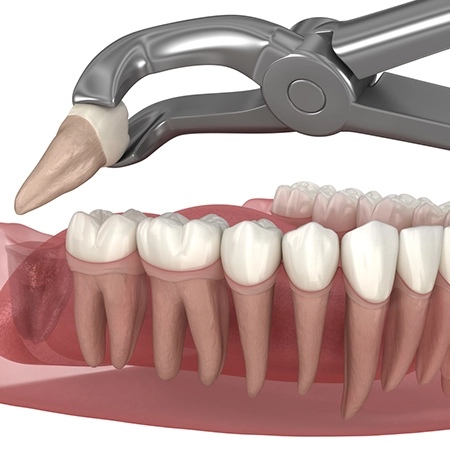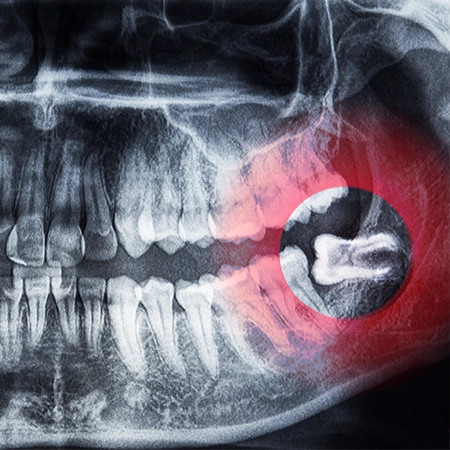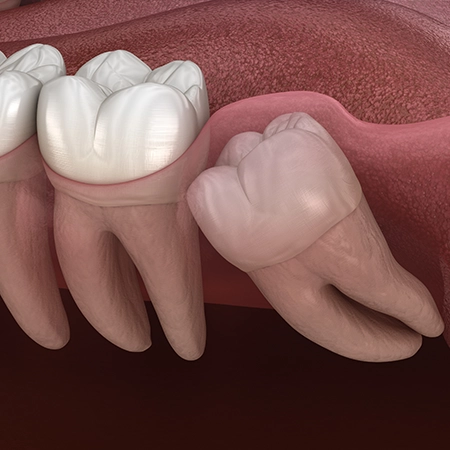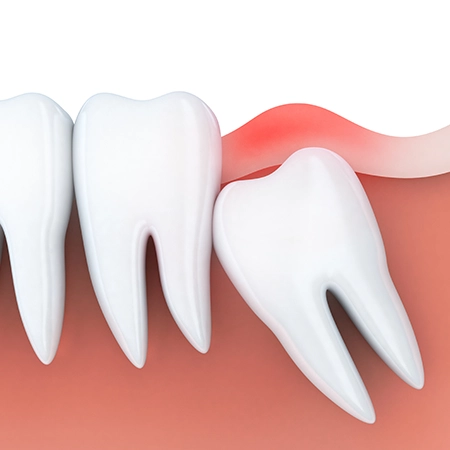Wisdom Tooth Extraction In Aurora, IL
Wisdom Tooth Extraction
The wisdom teeth, also known as third molars, are the last permanent teeth to erupt and usually appear between the ages of 17 and 25. Evolution has made these teeth unnecessary, and many people never develop them. For some, these teeth develop normally, and they have no issues.
However, many people have impacted wisdom teeth, which means they erupt only partially or not at all. Impacted wisdom teeth may:
- Grow at an angle toward the other teeth or towards the back of the mouth
- Grow at a right angle to the other teeth, as if it is lying down
- Grow straight up and down, but stays trapped in the jawbone
Impacted wisdom teeth can be painful and can cause issues for the neighboring teeth, but City of Lights Dental can remove these teeth.

Why Choose City of Lights Dental For Wisdom Tooth Extraction?
The dental team at City of Lights Dental is equipped to handle a variety of oral health concerns, including those involving wisdom teeth. We have the training necessary to properly remove these teeth. We also understand that many patients have anxiety when it comes to visiting the dentist. Therefore, we strive to create an environment that promotes relaxation and helps patients build trust in our experience and expertise.

What is Wisdom Tooth Extraction?
The wisdom teeth are the third molars, located in the very back of the mouth. Wisdom tooth extraction is the removal of these teeth. Removal is necessary because these teeth can often cause complications.
Signs and Symptoms of Wisdom Tooth
The only way to confirm that you need to have your wisdom teeth removed is with an examination. However, there are a few signs and symptoms that could indicate an issue:
- Pain/sensitivity near the wisdom teeth
- Inflammation/bleeding of the gums
- Sinus problems
- Headaches
- Cysts/abscess on the gumline near the wisdom teeth
- Unpleasant taste
- Foul odor
- Tooth decay
- Overcrowded/crooked teeth
Do you need to see a dentist for wisdom teeth?
Research indicates that not everyone needs their wisdom teeth removed. Patients may not need extraction if the wisdom teeth are:
- Fully erupted
- Healthy
- Positioned correctly with neighboring teeth
- Aligned properly with opposing teeth
- Able to be cleaned properly
Unfortunately, this isn’t always the case. Most of the time, there is not enough room in the jaw for these teeth, which causes a variety of oral and overall health concerns.

Who should have wisdom teeth extracted?
The American Dental Association states that wisdom tooth extraction may be necessary if:
- They are causing pain and/or infection
- You have cysts on the gum near the tooth
- You have tumors
- They are causing damage to neighboring teeth
- You have gum disease
- You have extensive tooth decay
Unfortunately, the decision to have wisdom teeth removed isn’t always obvious. You should schedule a consultation with your dentist or oral surgeon to evaluate your wisdom teeth and explain your options.

Wisdom Tooth Extraction Process
The process of wisdom tooth extraction at City of Lights Dental is fairly easy:
Consultation
The very first step in all of our procedures is consultation. This will allow us to examine your mouth and take any necessary images to determine if removal is necessary and the exact location of the teeth to make removal possible.
We will also discuss sedation options during this visit. If the removal is a simple one, local anesthesia may be all that you need. However, if surgical extraction is necessary, you may be offered sedation or general anesthesia.
During the Procedure
The procedure will begin with the administration of anesthesia. This will numb the teeth and gums and help you relax. Once the anesthesia has taken effect, the process will begin.
If the teeth are fully erupted, a simple extraction may be possible. If the teeth are impacted, an incision will be made in the gum to expose the teeth. Once the teeth are exposed, they will be loosened and removed from the socket. In some cases, the tooth may need to be cut into a few pieces to make removal easier.
Once the extraction is complete, the area will be cleaned to eliminate infection. The surgical site will be stitched closed, and gauze will be placed to slow bleeding.
Typically, the process takes less than an hour- but may take slightly longer if the case is especially complex.
Aftercare
Most patients experience some minor discomfort in addition to slight bleeding and swelling. However, you will be provided with instructions on managing the symptoms before the procedure. Once the sedation wears off, a trusted friend/family member will drive you home.
There are several things to keep in mind as you recover from wisdom tooth removal:
- Leave the gauze in place for approximately 30 minutes. If necessary, you can place fresh gauze at this time- but as a general rule, the bleeding should have slowed by this time
- Get plenty of rest for at least 3 to 5 days- if your job is physically demanding, you may need up to a week
- Use an ice pack 20 minutes on/20 minutes off to reduce swelling
- Keep the surgical site clean with alcohol-free, antibacterial mouthwash- but do not swish, hold it in your mouth and let it soak. If you wish, the clots could dislodge, which can lead to a dry socket
- Brush and floss teeth daily to prevent the buildup of bacteria and plaque on neighboring teeth. You must use a soft-bristled toothbrush and avoid brushing directly over the site for a few days
- Take all medications as instructed
- Avoid drinking through a straw for a few days to reduce the risk of dry socket
- Avoid physically strenuous activities such as exercise and lifting heavy things for 2 to 3 days, potentially longer depending on your body’s ability to heal
- Stick to soft, easy-to-chew foods and avoid drinking carbonated or alcoholic beverages for a minimum of several days
How Much Does Wisdom Tooth Extraction Cost In Aurora, IL?
Several factors impact the cost of wisdom tooth extraction, including the type of extraction, anesthesia, the location of the clinic, experience/expertise of the dentist. However, the average costs are as follows:
- $75 to $200 per tooth for simple extractions
- $225 to $600 per tooth for surgical extractions under local anesthesia
- $40 to $90 for nitrous oxide
- $250 to $800 for general anesthesia
Other costs to consider are x-rays, which usually cost an average of $150. In some cases, initial and follow-up exams cost approximately $100 each.
If the procedure is medically necessary, most insurance plans will cover up to 50% of the costs associated with the procedure. If you do not have dental insurance or if your provider does not cover the procedure, we have some financing options to make the cost easier to manage.

Schedule Your Wisdom Tooth Extraction at City of Lights Dental in Aurora, IL
If your wisdom teeth are causing oral health concerns, schedule your consultation with the team at City of Lights Dental in Aurora, IL. We will perform a comprehensive exam and take X-rays to determine the best way to treat your wisdom tooth extraction.
Wisdom Tooth Extraction FAQs
If you have questions and/or concerns about wisdom tooth removal, the team at City of Lights will be glad to address them. We have the experience and expertise to help you understand this and other procedures.
Is wisdom teeth extraction painful?
Some soreness/tenderness following wisdom tooth extraction is expected. However, it can usually be controlled with prescription or OTC pain relievers. If you have severe pain accompanied by swelling, fever/chills, or other symptoms, it’s important to seek emergency treatment- you may have an infection.
Can I brush my teeth after wisdom teeth removal?
Yes, you should be able to return to brushing your teeth the day after wisdom teeth removal. However, you should stick with a soft-bristled toothbrush and be gentle when brushing the surgical site. You should also use an anti-bacterial, alcohol-free mouthwash to eliminate bacteria and prevent infection.
Why is wisdom tooth extraction expensive?
Wisdom tooth extraction is expensive because the procedure often requires sedation instead of local anesthesia. Plus, the wisdom teeth are located in the very back of the mouth, making the procedure more complex than a typical tooth extraction. Often, the teeth must be surgically removed instead of simply being pulled.
How many days should I take off for wisdom teeth recovery?
The amount of time you should take off to recover from wisdom tooth removal will depend on the complexity of the procedure and how your body heals. As a general rule, most people can return to their normal routines within a week. If you are still having pain and/or other complications after a week, it’s important to seek treatment.
Does wisdom tooth extraction infection go away?
If you have an infection following wisdom tooth extraction, it will not resolve on its own, you will need to seek treatment. The severity of the infection will determine the best course of treatment.

